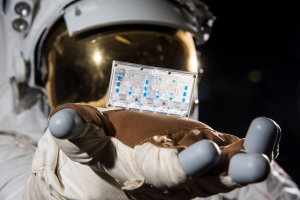 A Technology Networks article based on NIH-funded research describes how organ-on-a-chip microfluidic devices just reached the US’ NASA portion of the International Space Station (ISS), the ISS National Lab, last Wednesday as part of an investigation into the effects of aging, mimicked by weightlessness, on the immune system. The research team is led by Professor Sonja Schrepfer at UC-SF.
A Technology Networks article based on NIH-funded research describes how organ-on-a-chip microfluidic devices just reached the US’ NASA portion of the International Space Station (ISS), the ISS National Lab, last Wednesday as part of an investigation into the effects of aging, mimicked by weightlessness, on the immune system. The research team is led by Professor Sonja Schrepfer at UC-SF.
The immune system chips incorporate immune, bone marrow and blood vessel cells. The physiological effects of space flight on astronauts, and the tissues on these chips, are similar to those of aging, including bone and muscle loss and altered immune systems. The several dozen chips will be incubated for 2 weeks, and then frozen until they return to Earth for analysis at the Schrepfer lab. Future SpaceX re-supply missions to the ISS in March and April 2019 will bring kidney, bone/cartilage, and blood/brain barrier chip sets as part of the same research programme.
It is hoped that the research may provide better understanding of, and potentially improved therapies for the process of aging.
